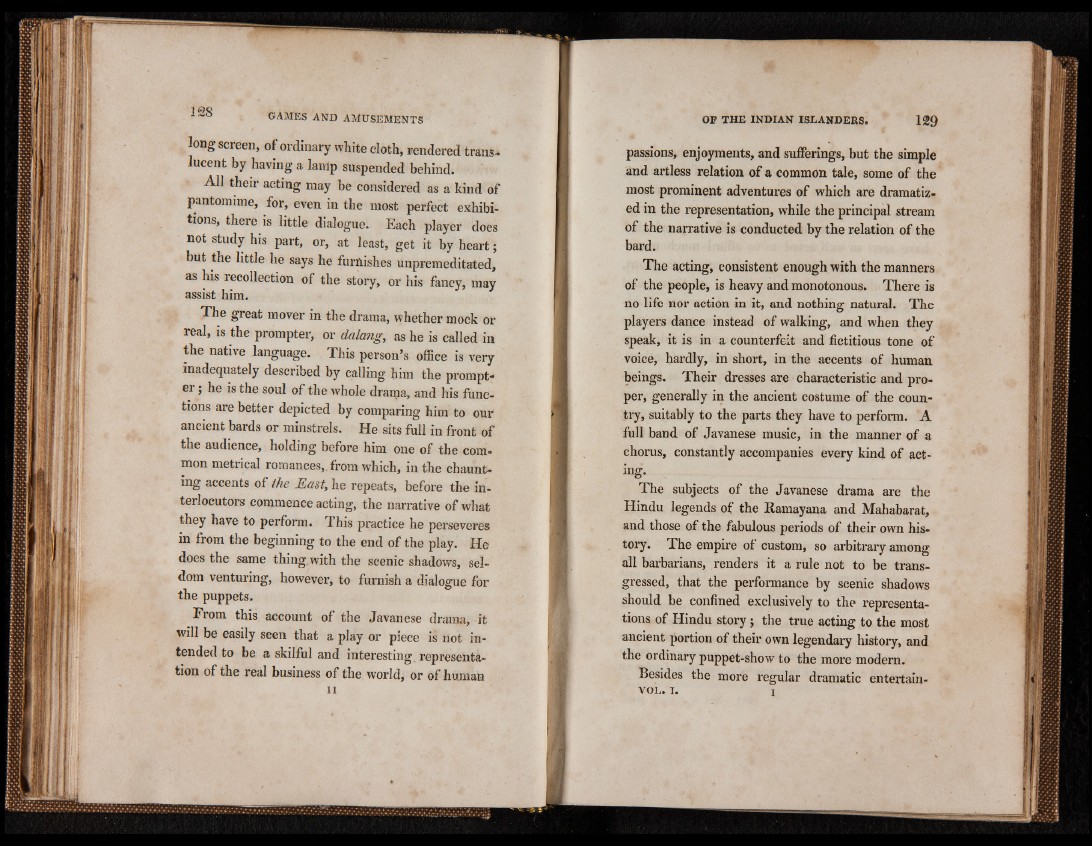
long screen, of ordinary white cloth, rendered translucent
by having a lamp suspended behind.
All their acting may be considered as a kind of
pantomime, for, even in the most perfect exhibitions,
there is little dialogue. Each player does
not study his part, or, at least, get it by heart ;
but the little he says he furnishes unpremeditated,
as his recollection of the story, or his fancy, may
assist him.
The great mover in the drama, whether mock or
real, is the prompter, or dalang, as he is called in
the native language. This person’s office is very
inadequately described by calling him the prompter
; he is the soul of the whole drama, and his functions
are better depicted by comparing him to our
ancient bards or minstrels. He sits full in front of
the audience, holding before him one of the common
metrical romances,, from which, in the chaunt-
ing accents of the East, he repeats, before the interlocutors
commence acting, the narrative of what
they have to perform. This practice he perseveres
in from the beginning to the end of the play. He
does the same thing, with the scenic shadows, seldom
venturing, however, to furnish a dialogue for
the puppets.
From this account of the Javanese drama, it
will be easily seen that a play or piece is not intended
to be a skilful and interesting representation
of the real business of the world, or of human
passions, enjoyments, and sufferings, but the simple
and artless relation of a common tale, some of the
most prominent adventures of which are dramatized
in the representation, while the principal stream
of the narrative is conducted by the relation of the
bard.
The acting, consistent enough with the manners
of the people, is heavy and monotonous. There is
no life nor action in it, and nothing natural. The
players dance instead of walking, and when they
speak, it is in a counterfeit and fictitious tone of
voice, hardly, in short, in the accents of human
beings. Their dresses are characteristic and proper,
generally in the ancient costume of the country,
suitably to the parts they have to perform. A
full band of Javanese music, in the manner of a
chorus, constantly accompanies every kind of acting
,
The subjects of the Javanese drama are the
Hindu legends of the Ramayana and Mahabarat,
and those of the fabulous periods of their own history.
The empire of custom, so arbitrary among
all barbarians, renders it a rule not to be transgressed,
that the performance by scenic shadows
should be confined exclusively to the representations
of Hindu story; the true acting to the most
ancient portion of their own legendary history, and
the ordinary puppet-show to the more modern.
Besides the more regular dramatic entertain-
VOL. I. i